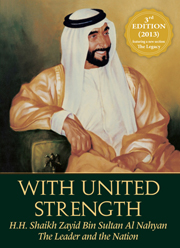Book contents
- Frontmatter
- Contents
- Note on Transliteration
- Abbreviations and Acronyms
- Foreword
- Introduction
- Part I The Heritage
- Part II The Transformation
- Part III The Union
- Chapter 7 Birth of a Nation
- Chapter 8 Sustaining the State
- Chapter 9 Defense and Preservation
- Chapter 10 With United Strength
- Part IV The Legacy
- Conclusion
- Notes
- Select Bibliography
- Index
- Plate Section
Chapter 9 - Defense and Preservation
from Part III - The Union
Published online by Cambridge University Press: 05 September 2014
- Frontmatter
- Contents
- Note on Transliteration
- Abbreviations and Acronyms
- Foreword
- Introduction
- Part I The Heritage
- Part II The Transformation
- Part III The Union
- Chapter 7 Birth of a Nation
- Chapter 8 Sustaining the State
- Chapter 9 Defense and Preservation
- Chapter 10 With United Strength
- Part IV The Legacy
- Conclusion
- Notes
- Select Bibliography
- Index
- Plate Section
Summary
As a nation possessing vast reserves of oil, the United Arab Emirates had to defend its valuable natural resources from its inception. External rather than internal threats posed the most immediate danger to the new state. For the UAE, challenges to its new-found independence came from the more populous neighboring states as well as more distant powers, such as the United States and the Soviet Union. Each of these powers was seeking to extend its influence over the region and over the fledgling state. Such challenges compounded the complexities of internal consolidation and exacerbated the tasks of building the state and strengthening the Federation. Furthermore, on National Day 1971, the UAE was not yet well equipped to defend itself. The strategic vision of Shaikh Zayid Bin Sultan and his remarkable ability to out-maneuver potential enemies were crucial in protecting the new state from disaster.
Shaikh Zayid knew that the challenges of defending first Abu Dhabi and later the UAE were complex. He responded by developing a policy that operated along three axes. First, national security depended on forging a united nation. He knew from history that more citadels were betrayed from within than were ever taken by force. Thus, fostering popular support for the new state and securing the commitment of his fellow Rulers was absolutely essential. Second, he needed to ensure that any potential aggressor realized that an assault on the UAE and its resources would exact a high price. This required armed forces of high caliber and, above all, units that were well equipped.
- Type
- Chapter
- Information
- With United StrengthHH Sheikh Zayed Bin Sultan Al Nahyan: The Leader and the Nation, pp. 217 - 242Publisher: Emirates Center for Strategic Studies and ResearchPrint publication year: 2013



